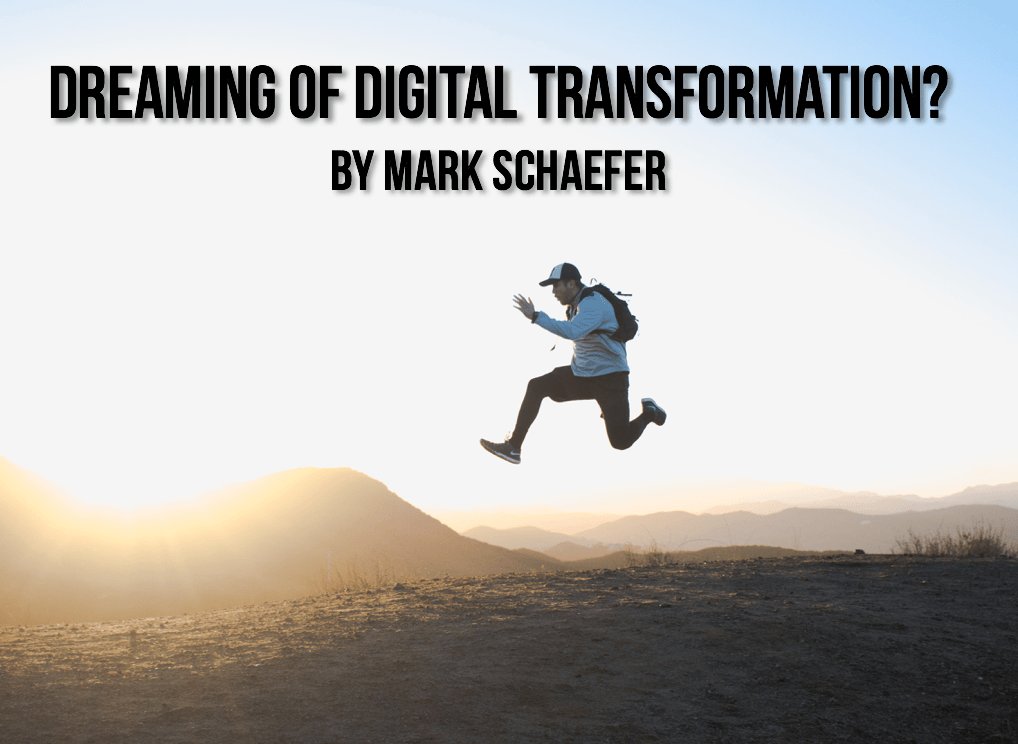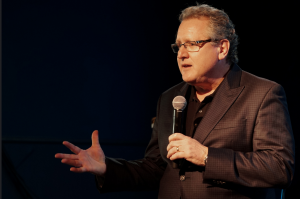
By Mark Schaefer
My favorite event of the year is attending the massive SXSW Interactive conference each spring. A lot of people go to connect and party … I go to learn. It’s an experience like no other. I get to listen to the greatest innovators, technologists, and thinkers on the planet. For years, I had a fantasy of of starting a new podcast where I talked to these amazing people.
Where I stalled was finding a sponsor for such a broad, forward-thinking production. There are only a handful of tech companies in the world that might be interested, and one of those was Dell. When I brought the idea up to them, they said they liked the concept so much they wanted me to host the show for them! It was an opportunity too good to pass up.
So over the last few months I’ve been recording episodes of a new podcast called Luminaries: Talking to the Brightest Minds in Tech. It’s a show all about the challenges of digital transformation and believe me, we are getting into some WILD conversations!
I said “we” because I have a co-host on the show, Douglas Karr. Together, we’ve already covered a lot of ground on the show. Here’s a sample of quotes from some of the fascinating episodes on the horizon:
Can you predict disruption?
John Roese, Global Chief Technology Officer at Dell-EMC & Chairman, Cloud Foundry Foundation
John is focused on disrupting his own teams and his own company. I wondered … Can you predict where disruption will come next? This was his answer:
 “I do believe there is a methodology to disruption and that by analyzing trends and patterns you can see what might be happening next, where the market needs to go. We use many analytical tools but one example is when we go to customer meetings, we take lots of notes. We dump these notes into a big data engine and we try to determine if there are patterns emerging, if there are new trends and customer goals. Sometimes that early warning might give us a hint about what we’re missing or something that might be materializing. Blockchain was a good example of this. It sort of operates above the layers where we typically work but we saw the interest in this increase dramatically. This led to us incorporating this into some of our product and service offerings.
“I do believe there is a methodology to disruption and that by analyzing trends and patterns you can see what might be happening next, where the market needs to go. We use many analytical tools but one example is when we go to customer meetings, we take lots of notes. We dump these notes into a big data engine and we try to determine if there are patterns emerging, if there are new trends and customer goals. Sometimes that early warning might give us a hint about what we’re missing or something that might be materializing. Blockchain was a good example of this. It sort of operates above the layers where we typically work but we saw the interest in this increase dramatically. This led to us incorporating this into some of our product and service offerings.
“There is no one source of ideas. The best thing to do is keep your eyes open, cast a wide net with your conversations, and realize that the next big thing can come from somewhere unexpected, even outside your industry.”
Women in tech – a long way to go
Dr. Orna Berry, member Women in Technology International Hall of Fame, scientist, high-tech entrepreneur, businesswoman, senior director among the Israeli science and technology industries and laureate of the Ben-Gurion University of the Negev Award. She was the first woman to serve as Chief Scientist and head of the industrial R&D operation of the Israeli Ministry of Industry, Trade and Labour.
In 2003, Dr. Berry co-authored a seminal report on women in the tech workplace. It provided a harsh and accurate assessment of how women were leaking out of the workforce at every level. I asked her how things have changed since she wrote that report.
 “Not much has changed. People talk about stereotypes and people talk about corrective actions, but they really do not make an effort at looking at results.
“Not much has changed. People talk about stereotypes and people talk about corrective actions, but they really do not make an effort at looking at results.
“Women are still paid less than men. And it’s not just pay. It’s the other economic conditions too, whether it’s stock options or other compensation, it’s inferior. And the number of women in all the organizational layers is sufficiently small that they don’t have influence. They work harder in order to even be heard and have influence … even when they are experts.
“Until we see 30 percent in the board room, in top management, and have that percolate down below, until we see men and women being promoted at the same rate, until we see the financial conditions as the same, we cannot say we’ve gone forward. Until this is equal, we still be in a race for talent, we’re going to pay more for talent, and we’re going to have insufficient expertise because we’ve avoided a significant part of the population.”
Transformation depends on trust
Ray O’Farrell, Executive VP and CTO of VMWare
When VMWare exploded on the scene in the late 1990s, it transformed the IT industry. I asked Ray what it was like to introduce a world-shaking technology like that.
 “The first priority is to create a product that just works. When we introduced VMware, it just worked, and to some people, at the time it just seemed like magic. The second issue is that if something went wrong, you have to be all over it. We built deep personal relationships with our customers. We would be on the phone trying to work things through and if that didn’t work we would go on site. The key to success is building trust. The CTO is really the Chief Trust Officer.
“The first priority is to create a product that just works. When we introduced VMware, it just worked, and to some people, at the time it just seemed like magic. The second issue is that if something went wrong, you have to be all over it. We built deep personal relationships with our customers. We would be on the phone trying to work things through and if that didn’t work we would go on site. The key to success is building trust. The CTO is really the Chief Trust Officer.
“As a leader, you need to create a culture of safety. You need to communicate that the risk of taking a risk is lower than the risk of not taking a risk. If you aren’t moving fast, your competitors will leave you behind so every person in the organization has to be pushing the envelope. It’s not just about technology. disruption might be in the way we sell, the way we communicate with customers, the way we serve them. Disruption doesn’t mean destroying the company or upsetting a lot of customers, so change still has to be tested and managed carefully, but when those ideas do work, it can have a very, very powerful impact on the company and the culture.”
Smaller, cheaper, faster … leads to the Internet of Things
Liam Quinn, Chief Technology Officer, Sr. Vice President, Senior Fellow for Dell
Liam is a technology visionary and responsible for a team that places bets on tech investments and strategy for Dell. The company is placing a big bet on the Internet of Things:
 “I think the innovation process can be learned. It’s a matter of curiosity. It’s about imagining, what would you do if you had magic for a moment … to solve something. That’s my approach to solving problems. What would that magic be, and hopefully that turns into IP. It’s not that somebody just starts doing these things. You can innovate, practice and get better at it over time.
“I think the innovation process can be learned. It’s a matter of curiosity. It’s about imagining, what would you do if you had magic for a moment … to solve something. That’s my approach to solving problems. What would that magic be, and hopefully that turns into IP. It’s not that somebody just starts doing these things. You can innovate, practice and get better at it over time.
“Technology is getting is getting faster, it’s getting smaller, it’s getting cheaper. The processor you have in your smartphone is more powerful than the million-dollar machine I worked on as a young man. Ten years from now the processor in your phone will be a fraction of the cost it is now and even smaller.
“Where is this leading? Computing power is getting so small and cheap that we will be able to apply these devices to efforts that are not IT. That’s what the Internet of Things is about — it’s applying the Internet to the physical world. So we’re integrating all these devices and that presents a whole new set of challenges — managing the data from all these devices, securing these devices, accounting for these devices.”
The advantage in starting a business today
Michele Perras is an entrepreneur, investor, advisor, consultant. Head of strategy and business development Pivotal, Inc.
Michele has had an extraordinary career that began as an artisan goldsmith, entrepreneur, founder of an accelerator, and now working for Pivotal, a remarkable company that brings new tech businesses to life. I asked her how it is different to start a business today compared to five years ago.
 “It is so much easier to start business today compared to a few years ago — there are so many more resources available! You have an opportunity to become connected to individuals who can help you and that has scaled so effectively over the last few years. Anyone can set up a business in four hours. Anyone can build a prototype of an application within two or three hours, given the tools and the know-how.
“It is so much easier to start business today compared to a few years ago — there are so many more resources available! You have an opportunity to become connected to individuals who can help you and that has scaled so effectively over the last few years. Anyone can set up a business in four hours. Anyone can build a prototype of an application within two or three hours, given the tools and the know-how.
“In 2007, I started an accelerator and we literally had to bring people into companies to get them access to what they needed to start a business because these tools weren’t available like they are today. There’s much better access to capital — at least for some, women still get less than 3 percent of capital investment, but that’s improving.
“Because entrepreneurship is getting so much attention, it has become the thing to do, so it is getting a lot attention and resources.”
Transformation starts with leadership, not technology
Trey Layton, SVP, Chief Technology Officer, CPSD at Dell EMC
Trey is a fascinating man who started his career as an intelligence officer with the United States Army. He had some interesting observations about the role of culture in transformation:
 “So many companies have bought into the idea of transformation. They know they need to transform their IT infrastructure. But as they begin to explore the idea, they need to start define what they need to do to accelerate and achieve escape velocity on their change effort. Embracing change isn’t buying something necessarily, it’s going all-in from a leadership perspective. It’s really something great to see — so many companies are starting to get it. The technology is easy. It’s getting people to think differently that’s the hard part.”
“So many companies have bought into the idea of transformation. They know they need to transform their IT infrastructure. But as they begin to explore the idea, they need to start define what they need to do to accelerate and achieve escape velocity on their change effort. Embracing change isn’t buying something necessarily, it’s going all-in from a leadership perspective. It’s really something great to see — so many companies are starting to get it. The technology is easy. It’s getting people to think differently that’s the hard part.”
If you’ve enjoyed these insights you’re going to love this monthly podcast. Please consider subscribing to it and becoming part of our community.
 Mark Schaefer is the chief blogger for this site, executive director of Schaefer Marketing Solutions, and the author of several best-selling digital marketing books. He is an acclaimed keynote speaker, college educator, and business consultant. The Marketing Companion podcast is among the top business podcasts in the world. Contact Mark to have him speak to your company event or conference soon.
Mark Schaefer is the chief blogger for this site, executive director of Schaefer Marketing Solutions, and the author of several best-selling digital marketing books. He is an acclaimed keynote speaker, college educator, and business consultant. The Marketing Companion podcast is among the top business podcasts in the world. Contact Mark to have him speak to your company event or conference soon.
Dell is a client. Photo marked as safe for re-use by Unsplash.com


